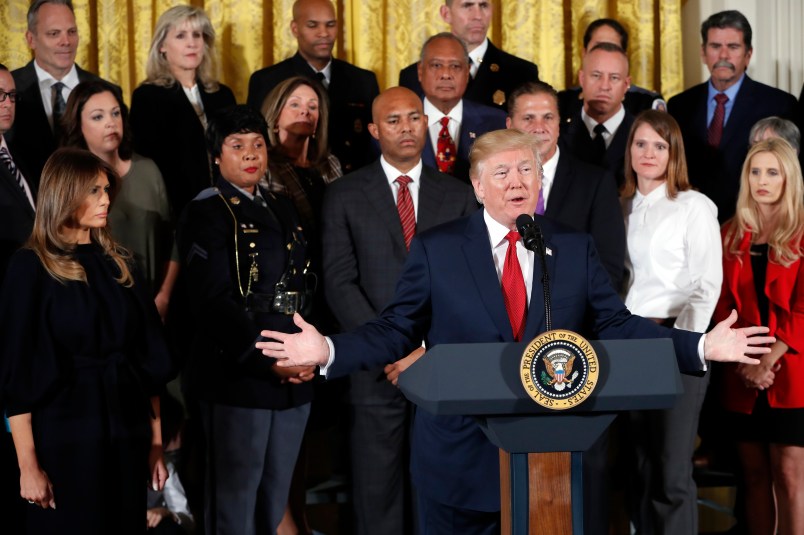WASHINGTON (AP) — In ringing terms, President Donald Trump on Thursday declared the opioid crisis a nationwide public health emergency — a step that won’t bring new dollars to fight a scourge that kills nearly 100 Americans a day but will expand access to medical services in rural areas, among other changes.
“This epidemic is a national health emergency,” Trump said in a speech at the White House, where he bemoaned a crisis he said had spared no segment of American society.
“As Americans we cannot allow this to continue,” he said.
Administration officials have made clear that the declaration, which lasts for 90 days and can be renewed, comes with no dedicated dollars. But they said it will allow them to use existing money to better fight the crisis. Officials also said they would urge Congress, during end-of-the year budget negotiations, to add new cash to a public health emergency fund that Congress hasn’t replenished for years.
The Public Health Emergency Fund currently contains just $57,000, according to the Department of Health and Human Services, a negligible amount. Officials would not disclose how much they were seeking.
But critics said that wasn’t enough.
“How can you say it’s an emergency if we’re not going to put a new nickel in it?” said Dr. Joseph Parks, medical director of the nonprofit National Council for Behavioral Health, which advocates for addiction treatment providers. “As far as moving the money around,” he added, “that’s like robbing Peter to pay Paul.”
Democratic House leader Nancy Pelosi also was critical, calling the new declaration “words without the money.”
Trump’s audience Thursday included parents who have lost children to drug overdoses, people who have struggled with addiction, and first responders whose have used overdose reversal drugs to save lives.
Trump also spoke personally about his own family’s experience with addiction: His older brother, Fred Jr., died after struggling with alcoholism. It’s the reason the president does not drink.
Trump described his brother as a “great guy, best looking guy,” with a personality “much better than mine”
“But he had a problem, he had a problem with alcohol,” the president said. “I learned because of Fred.”
Trump said he hoped a massive advertising campaign, which sounded reminiscent of the 1980s “Just Say No” campaign, might have a similar impact.
“If we can teach young people, and people generally, not to start, it’s really, really easy not to take ’em,” he said.
Leading up to the announcement, Trump had said he wanted to give his administration the “power to do things that you can’t do right now.” As a candidate, he had pledged to make fighting addiction a priority, and pressed the issue in some of the states hardest hit.
“When I won the New Hampshire primary, I promised the people of New Hampshire that I would stop drugs from pouring into your communities. I am now doubling down on that promise, and can guarantee you we will not only stop the drugs from pouring in, but we will help all of those people so seriously addicted get the assistance they need to unchain themselves,” Trump told a crowd in Maine weeks before last November’s election.
Once in office, Trump assembled a commission, led by Gov. Chris Christie of New Jersey, to study the problem. The commission’s interim report argued an emergency declaration would free additional money and resources, but some in Trump’s administration disagreed.
Christie, in a statement, said Trump was taking “bold action” that shows “an unprecedented commitment to fighting this epidemic and placing the weight of the presidency behind saving lives across the country.”
Officials said the administration had considered a bolder emergency declaration, under the Stafford Act, which is typically used for natural disasters like hurricanes. But they decided that measure was better suited to more short-term, location-specific crises than the opioid problem. Drug overdoses of all kinds kill an estimated 142 Americans every day.
As a result of the public health emergency declaration, officials will be able to expand access to telemedicine services, include substance abuse treatment for people living in rural and remote areas. Officials will also be able to more easily deploy state and federal workers, secure Department of Labor grants for the unemployed, and shift funding for HIV and AIDs programs to provide more substance abuse treatment for people already eligible for those programs.
Trump also directed other departments and agencies to exercise their own available emergency authorities to address the crisis.
But Sen. Richard Blumenthal (D-CT), said the effort falls far short of what is needed and will diverts staff and resources from other vital public health initiatives.
“Families in Connecticut suffering from the opioid epidemic deserve better than half measures and empty rhetoric offered seemingly as an afterthought,” he said in a statement. He argued, “An emergency of this magnitude must be met with sustained, robust funding and comprehensive treatment programs.”
Democrats also criticize Trump’s efforts to repeal and replace the “Obamacare” health law. Its Medicaid expansion has been crucial in confronting the opioid epidemic.
Adopted by 31 states, the Medicaid expansion provides coverage to low-income adults previously not eligible. Many are in their 20s and 30s, a demographic hit hard by the epidemic. Medicaid pays for detox and long-term treatment.







I’ll just leave that there. Really, this shit just writes itself.
Trump had promised to make it a national emergency.
Calling it a public health emergency carries less eight and offers fewer resources.
Typical Trump bait and switch.
Remember when they couldn’t even manage to do an Easter Egg hunt and had to bring in the Obama people to save the event? Even less thought and effort went into this. A staff that didn’t hate him wouldn’t let him roll out anything so lame and pathetic.
Who’s going to declare Trump a nationwide Public Health Emergency?
https://uk.news.yahoo.com/donald-trump-apos-personality-disorder-135112392.html
I could not agree more.
Seriously.
But enough about the Trump presidency…